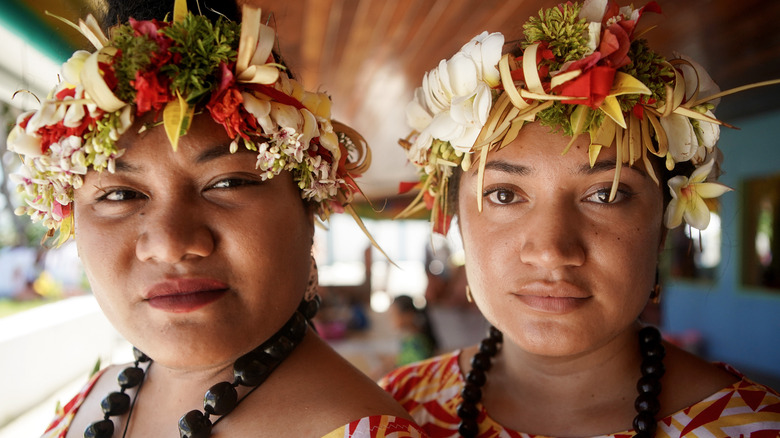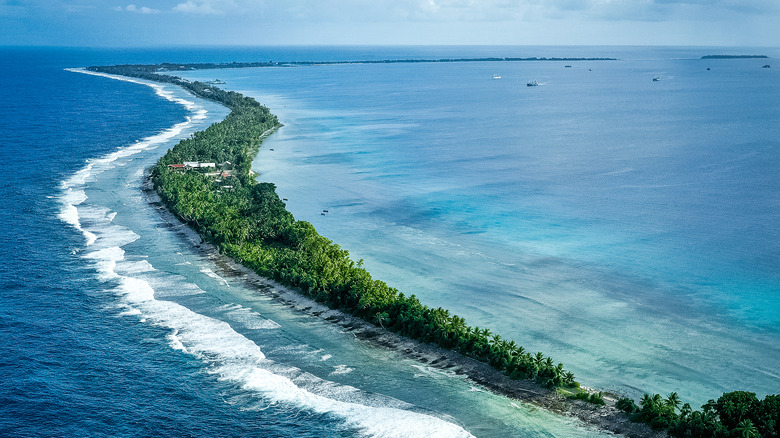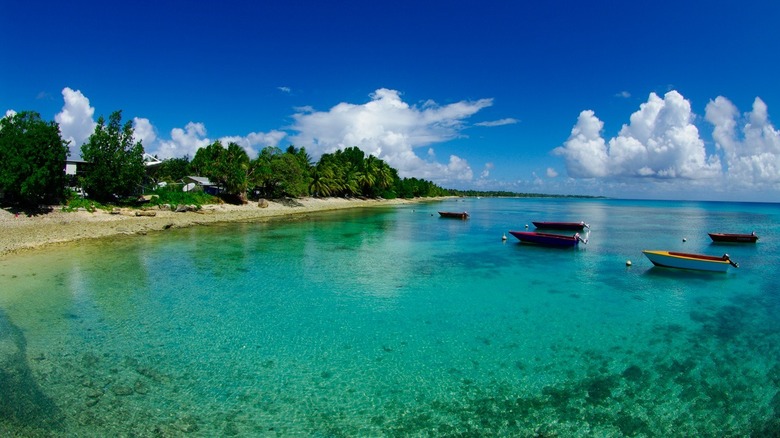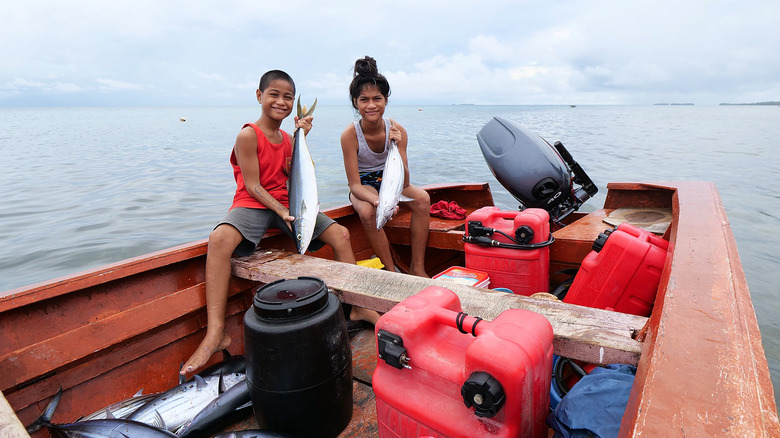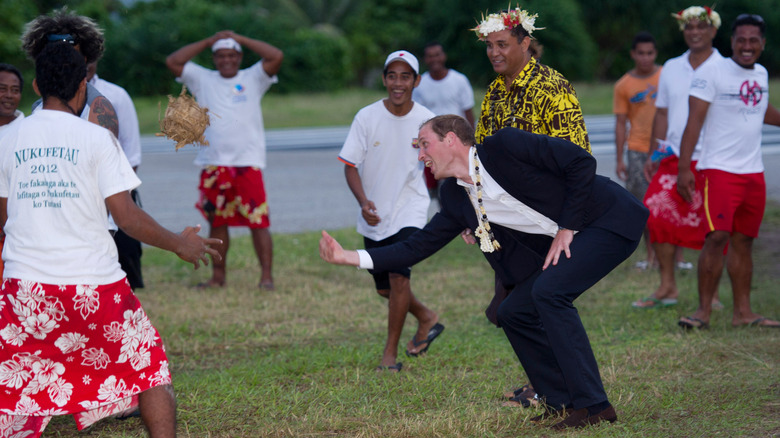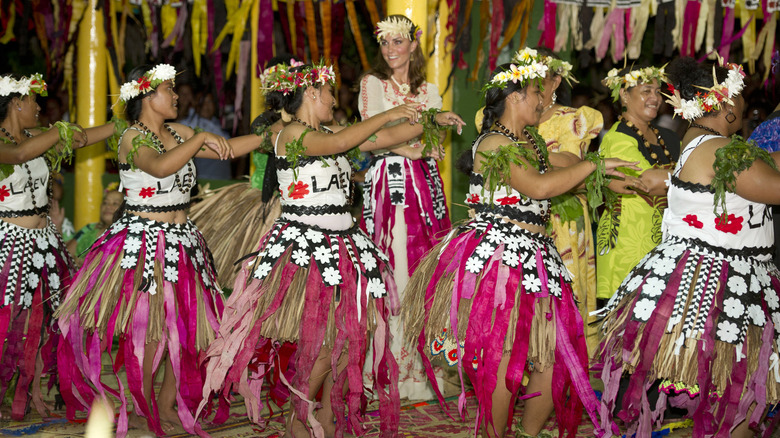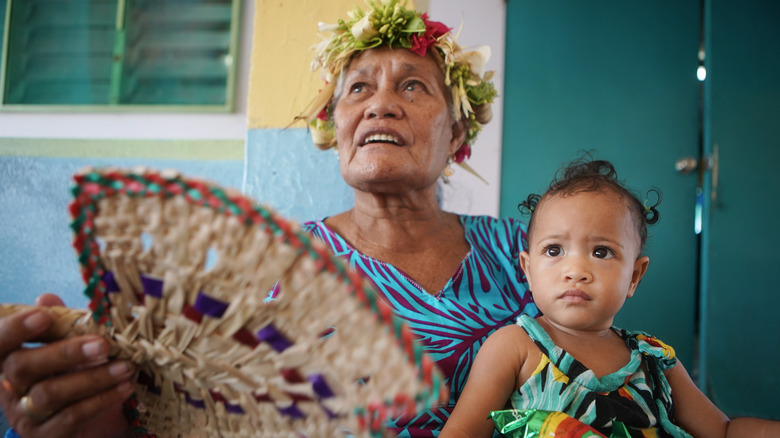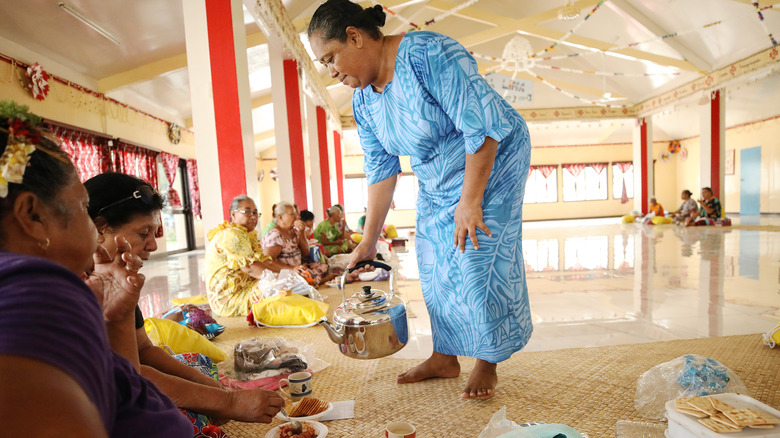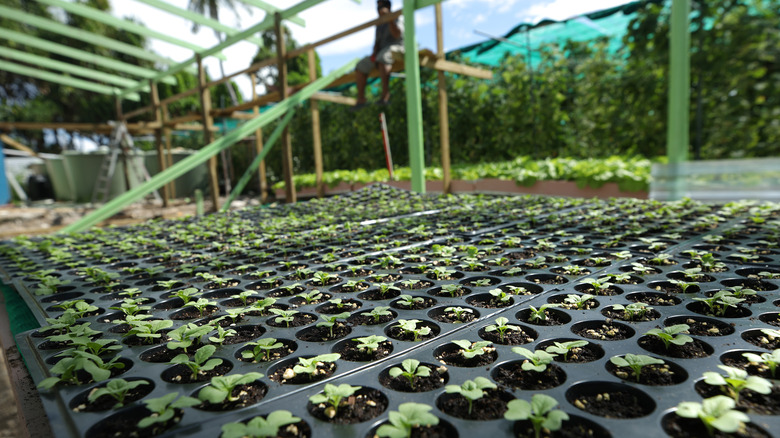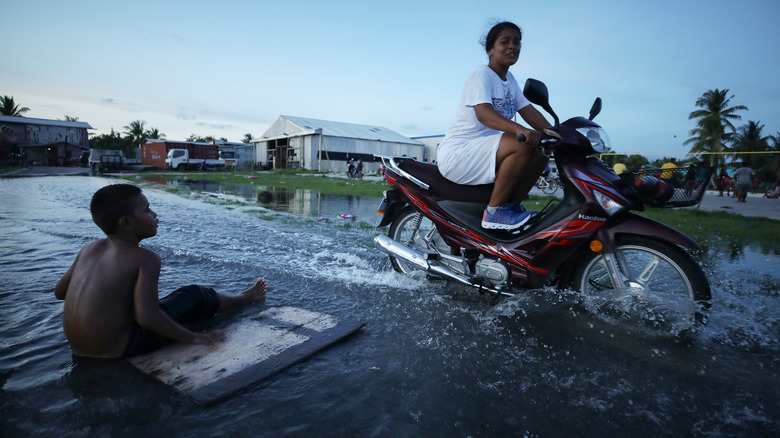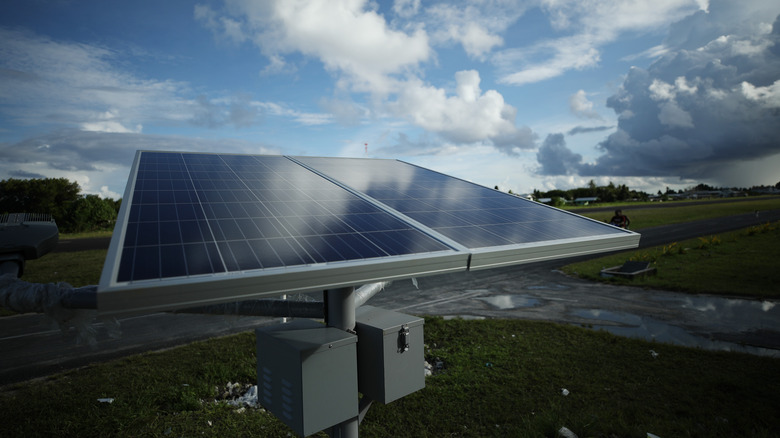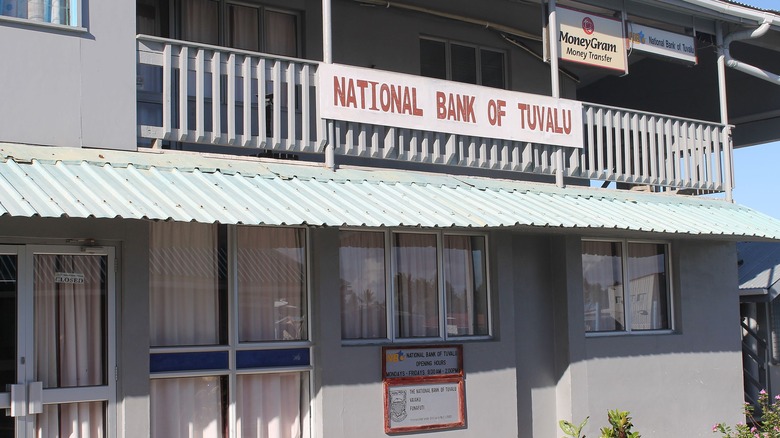What It's Really Like To Live In The Smallest Country In The World
Tuvalu is the world's smallest republic by population. According to the CIA Factbook, 11,448 people are estimated to live on this nine-island nation. Only the Vatican is a smaller independent state.
You might think that living within a tiny series of islands in the South Pacific would be akin to living in paradise, and in many ways it comes close. Tuvaluans celebrate a traditional Polynesian culture that emphasizes community, consensus, and hospitality. However, Tuvalu is under existential threat. The country is one of global warming's first victims, and rising oceans caused by climate change are promising to wash Tuvalu off the map. This has impacted almost every aspect of Tuvaluan life, which is quickly pivoting to avoid becoming the poster child of global catastrophe. That context, more than anything else, has to be considered to understand what it's really like to live in the smallest country in the world.
Let's take a look at Tuvalu, what it is like to live there, and also how climate change has changed life in this island nation.
If you live in Tuvalu, you won't climb hills
If you were to fly a plane from Hawaii to Australia, you would pass over Tuvalu at around the halfway point. According to the CIA Factbook, the country consists of nine coral atolls that amount to a total landmass of around 10 square miles. This makes Tuvulo roughly one tenth of the size of Washington, D.C. in land area. However, Tuvolo's islands are spread out over an area that would extend from Erie, Pennsylvania to Chesapeake Bay. This means that getting around from island to island is a lengthy process. Seaplanes are used, but it's more common to use a government vessel that shuttles people among the islands.
If you lived in Tuvalu, you'd most likely live on the atoll of Funafuti, the capital. According to Britannica, over half of the population resides here. Tuvalu and all its coral atolls are low-lying. The highest elevation is only 10 meters (around 33 feet). A person living in Tuvalu sees no hills, much less mountains. There is only a flat sliver of land surrounded by an even flatter expanse of seemingly infinite sea. This geography also means that there are no rivers. As a result, all fresh water is supplied through catchment systems or through desalination processes — a method that is becoming more popular due to the water supply being tainted by salt water. More on that later.
If you are from Tuvalu, your ancestors were likely Samoan
Tuvaluans are Polynesians. As detailed by the Britannica, people primarily from Samoa, but also Tonga and other Polynesian islands, first migrated to Tuvalu in the 14th century. In addition, a smattering of Micronesians also settled on one of the islands.
Europeans first encountered Tuvalu in the 16th century during the voyages of the Spanish explorer Álvaro de Mendaña de Neira. However, the islands did not encounter the full brunt of Western imperialism until the 19th century. In the mid-19th century, the BBC reports, Tuvalu was subject to "blackbirding" raids that resulted in the kidnapping of around 400 people who were used as laborers. Between these depredations and disease, Tuvalu's population dropped from 20,000 to about 3,000. Perhaps the worst incident was an 1863 raid by Peruvian slave traders who seized about 400 Tuvaluans.
The islands became a British protectorate in 1892, when they were known as the Ellice Islands and were incorporated administratively with the Gilbert Islands (now Kiribati). This political union became a source of ethnic tensions since the Gilbert Islands were Micronesian and culturally different from the Ellice Islands. This tension built into the 1960s, then, in 1978, Tuvalu split from the Gilbert Islands and transitioned from a British colony to its own independent country.
If you live in Tuvalu, you are likely a farmer, fisher, or both
For those who live in Tuvalu, there are relatively few career options. According to Britannica, most Tuvaluans are subsistence farmers who tend private gardens and fish from canoes. About 10% of the population works overseas. Merchant shipping is an attractive option, as is working at the nearby island of Nauru in its phosphate industry. Tuvalu as a whole is an import-driven country. Most of its food supply, goods, and fuel is purchased from abroad, particularly, Australia, New Zealand, Fiji, and Japan.
Of its exports, collectible stamps and currencies have the highest value. Tourism brought in by cruises and control of fishing rights are also important to Tuvalu's economy. One of Tuvalu's greatest income potentials is through its control of the country domain name .tv. According to the Washington Post, the Tuvalu government makes millions off of its agreements and royalties associated with the domain name. Tuvalu's Minister of Finance, Seve Paeniu, was quoted in the Washington Post as saying, "It enables the government to provide essential services to its people through providing schooling and education for the kids, providing medical services to our people, and also in terms of improving the basic economic infrastructure and service delivery to our communities."
According to the United Nations, Tuvalu is classified as a Least Developed Country, but "has met the threshold for graduation to developing country status based on its human development indicators and high per capita income."
If you live in Tuvalu, you are probably a fan of Te Ano
Sports are popular on Tuvalu and soccer is probably the most beloved. Tuvaluan soccer clubs compete internationally. Tuvaluans also plays kilikiti, which, as reported by the BBC, is a form of cricket, which was originally introduced to the South Pacific by the British. Another, more homegrown, game is Te Ano which, according to the Museum of New Zealand, is the national pastime of Tuvalu.
As described by Lonely Planet, in Te Ano two teams, which include women and men, face off across a playing field. Each team has a captain, a catcher, and a number of other players called vaka, who stand behind the two main players. Play starts when both sides each take a small round ball (the ano) covered with pandamus leaves, which is hand-batted by the captain to the other team. The vaka then hit the ball by hand, keeping it off the ground with the intent of it going to the catcher, who then can pass it to the captain to return to the opposition. It is sort of like volleyball. When a team drops a ball, the other side gets a point. The first side to reach ten points wins. Prince William played Te Ano in 2012, while on tour celebrating the Queen's Diamond Jubilee.
If you are from Tuvalu, you enjoy a long tradition of song
Tuvalu's cultural elements also contain a long tradition of song. According to "Songs of Tuvalu," Tuvualuan songs contain few lyrics, but concentrate on major themes of love, events, and nature. Death is rarely sung about in the most ancient songs. Traditionally, status and esteem is given to competent singers. This is the case in much of traditional Polynesia, but Tuvalu also has been heavily influenced by missionaries who came via Samoa and who Christianized Tuvalu. The missionaries sought to supplant traditional songs with those of European-style Christian hymns. As a result, the musical tradition in Tuvalu today is a combination of traditional Polynesia with heavy Christian influences in tone and style.
All of these music elements are also integrated with a dance tradition, most notably the fatele. This dance was originally performed from the sitting or kneeling position and consists of movements with the arms and hands. Their movements are supported by a mixed-gender chorus. This dance is the main dance performed in Tuvalu today, although the dancers now do it from a standing position. It is often accompanied by songs of Christian themes. On the same trip that brought Prince William to play Te Ano, his wife, Princess Catherine, took part in these traditional dances.
If you live in Tuvalu, you probably live with extended family
The small size of Tuvaluan society means that most people are aware of their extended kinship with other people on the islands. According to Florida International University, households in Tuvalu are based on the extended family. A typical Tuvaluan household consists of three generations — grandparents, children, and grandchildren. Because of their experience, grandparents are usually considered the most qualified to care for children, and all decisions have to be approved by the older generations. Gender roles are fairly defined with women running the households while men fish and farm.
The traditional type of home in Tuvalu is a fale, a rectangular open-sided house supported by stumps from coconut trees and covered with a thatched roof made from pandanus. Coral is used for the foundation, upon which a floor is built and covered by coconut mats. However, many Tuvaluans also live in more substantial Western-designed homes, particularly in well-populated Funafuti. This is mainly because a fale is more susceptible to destruction in cyclones than more modern constructions.
If you live in Tuvalu, you must be hospitable even if you don't want to be
If you were to move to Tuvalu, you would enter a culture centered on hospitality. As Florida International University points out, the people of this small country live so closely to each other that after greeting a person with a sniff, they do not inquire as to where they are going (there are not many places to go). Rather, they ask what they are doing or simply how are you. Visitors simply show up, though by common courtesy this is usually relegated to Sundays or times outside of working hours and meals.
Seashells are a common marker of Tuvaluan hospitality. Pacific Voices reports that shell necklaces are commonly given to friends and visitors, similar to the gift of lei in Hawaii. The conch shell in particular is important to people in Tuvalu. Historically, it was trumpeted to call people together for a community event or meeting, and is consequently a symbol of consensus and the shared challenges of this island people.
If you live in Tuvalu, you will likely eat a traditionally Polynesian diet
Food in Tuvalu is mainly traditional Polynesian fare. According to Britannica, the soils on Tuvalu are porous and not ideal for agriculture. However, farming has still allowed for the cultivation of coconut, breadfruit, taro, and bananas. Pandanus leaves have long been used for traditional structures and crafts, although in recent years this has been supplanted through materials imported from abroad.
Tuvalu farmers also often have pigs and chickens. However, Tuvaluan farming has become difficult due to the impact of climate change, forcing farmers to use new techniques such as greenhouse agriculture. In addition, the sea plays an important role in supporting the Tuvaluan diet. Meals are generally prepared in a separate structure according to Florida International University, and Tuvaluans follow a three-meal-a-day eating schedule.
In recent decades, Tuvalu has suffered from an obesity epidemic. According to the World Health Organization, well over half of all adults on Tuvalu are overweight and susceptible to diabetes Foreign Policy explains that this problem has its roots in the post-World War II westernization of the Pacific Islands. Imported food and sedentary lifestyles have created a public health menace not just on Tuvalu, but throughout Polynesia.
If you live in Tuvalu, you are probably really worried about climate change
Tuvalu's low-lying geography makes it highly vulnerable to the impact of climate change. As reported by the Guardian, "Tuvalu is sinking" has become a common phrase uttered throughout the country. This is no hyperbole but a true existential threat that is already impacting life in the country. As sea levels rise, the islands are gradually being covered by the surrounding ocean. And it is more than the loss of land itself. Freshwater resources have been contaminated, crops have become ruined, and fish have been contaminated — all due to climate change. As a result, the Tuvaluans had become increasingly dependent on foreign aid to survive. The UN Development Programme is planning infrastructure projects in order to save the islands, but the future certainly looks grim.
Evacuation of the islands is the last resort for Tuvaluans, although it seems that they might become the world's first climate change refugees. Neighboring Fiji has offered land for the people of Tuvalu to move to the south. However, Tuvalu has not yet accepted it.
If you live in Tuvalu, you will likely promote green energy
Because of the environmental existential crisis facing Tuvalu, it has committed itself to being a model of green energy, and those who live on Tuvalu are committed to the cause. The Tuvalu Energy Corporation is the sole supplier of electricity to the country. Historically, Tuvalu had been powered mainly by generators powered by imported diesel, but the state-owned corporation set the goal of all electricity being supplied by renewables by 2020. To reach this, PV Magazine reports, in 2019 the Asian Development Bank approved a $6 million grant to the country to support the installation of solar rooftops and batteries on Funafuti. While the data shows that the country has not yet quite met its goal of being entirely supplied by renewable energy, it has gone a long way from being an island nation that was powered entirely on fossil fuels. In fact, the country has increased its efforts, committing itself to being entirely green by 2025.
In 2019, the Pacific Centre for Renewable Energy and Energy Efficiency quoted then-Prime Minister Enele Sopoaga as saying, "Our emissions can be tiny, but our effort to go 100% renewable energy by 2025 is a symbol of global leadership on our fight against climate change. Our Energy targets and our NDC targets are a symbol of our push to global leaders to reduce their [green house gas] emissions."
If you live in Tuvalu, you won't be in a political party
If you were to move to Tuvalu, you might be thankful that there are no political parties. As described by the Australian Department of Foreign Affairs and Trade, after the country decolonized from the United Kingdom in 1978, it set up a 15-person unicameral parliament that is elected every four years. The Prime Minister and the cabinet are then elected by the parliament.
The island still retains links to the United Kingdom and Queen Elizabeth II is formally the head of state represented by a governor-general. It is undoubtedly because of the intimate size of the legislature that true political parties are unnecessary. This is not to say that politicians on Tuvalu all agree. Rather, they glom into informal factions. Research indicates that politics in Tuvalu are much more based on individual personalities and geography than political partisanship. Consensus is emphasized. Still, there are historic issues. Women are underrepresented, with only three female members of parliament being elected in the country's history. This is due, as in many places, to cultural gender roles.
If you live in Tuvalu, you use Australian dollars
Due to its small size, Tuvalu has historically had a less sophisticated means of banking than many other countries. There is no central bank or central banking authority. The only bank in the country is the National Bank of Tuvalu, a joint-private public venture with the government owning 60% of the institution. As reported by Coingeek, the country's official currency is the Australian dollar although, historically it did have its own coinage that was minted in Australia.
In Tuvalu, there is neither digital banking nor ATMs. As a result, all supplies of cash are shipped from island to island. Cash shortages are not unheard of, especially when Tuvaluans travel overseas, taking their money with them. As part of a number of initiatives, Tuvalu is exploring transforming itself based on an entirely digital economy. This in part is to help sever itself from reliance on foreign aid. It also is a part of a larger goal of digital self-preservation, considering that the island nation is so highly vulnerable.
